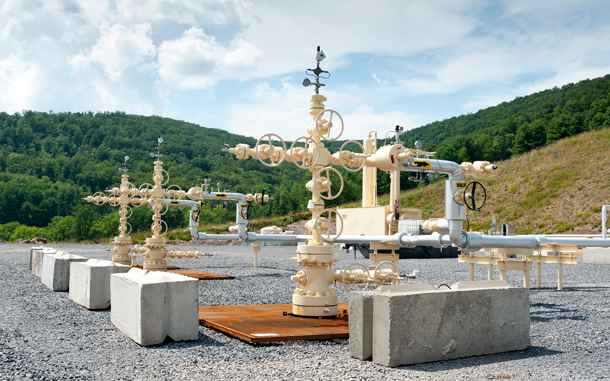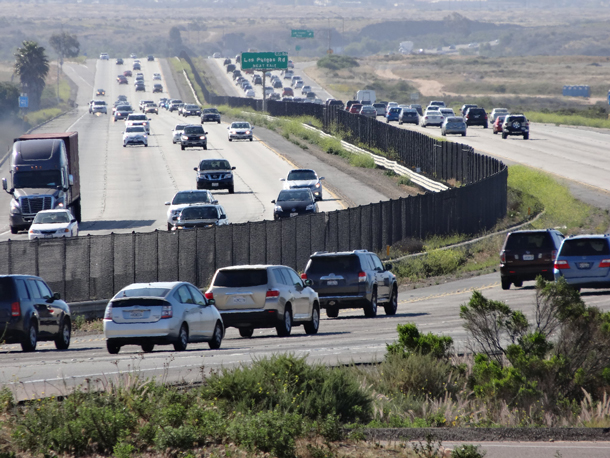Trump EPA Races to Finish Rollbacks
Air Date: Week of March 13, 2020

EPA regulations can take years to implement, and years to roll back and replace. (Photo: Paul A. Fagan, Flickr, CC BY-NC-ND 2.0)
The Trump administration is rushing to wrap up its weakening of environmental rules, just in case the Republicans lose the White House, or Senate, or both. But rollbacks of Obama administration methane regulations and auto efficiency standards are proving difficult to justify on a scientific basis. Jody Freeman, a Professor at Harvard Law School, joins Host Steve Curwood to discuss the significance of the greenhouse gas regulations and how a new administration could usher in a new era of climate policy.
Transcript
CURWOOD: As the 2020 general election draws near the Trump administration is rushing to weaken a number of environmental rules, just in case the Republicans lose the White House, or Senate or both. The EPA is now reportedly working under a deadline of May 20th to complete these rollbacks under the assumption that the changes would be protected from summary repeal by a new Democratic majority. The little known the Congressional Review Act allows a simple vote of both houses of congress to revoke any new rules or changes that were adopted in the last 60 legislative days of the previous congress, bypassing the usual and lengthy rulemaking process. When the Trump Administration came to power with Republicans in control of both houses, they used the act to immediately undo 16 Obama-era rules and Democrats could plausibly do so as well if the election turns out in their favor. For more we turn now to Jody Freeman, a professor at Harvard Law School who served as Counselor for Energy and Climate Change in the Obama White House. Jody, welcome to Living on Earth!
FREEMAN: Great to be here, thanks, Steve.
CURWOOD: So let's talk about some of the signature rules that the Trump administration EPA is trying to wrap up before this May deadline.
FREEMAN: Well, there are a few big rules that have to do with climate change in particular, and one that has to do with science that they're really racing to finish, I think. One of them would be to roll back the methane standards that regulate the methane emissions that come from the oil and gas sector. And that's important because these methane leaks are really bad for the climate. This is a very potent greenhouse gas. And the Obama folks put in place standards to control them and the Trump folks want to roll those back. The other big rule that's been very controversial that the administration has been working on for a couple years now is the fuel efficiency and greenhouse gas standards for cars and trucks. That was a pillar of the Obama administration's climate policy and the Trump administration has proposed to freeze those standards in place in a way that will make it very difficult to cut GHGs for the transport sector.
CURWOOD: So just how important are these auto efficiency standards?

The Trump EPA is seeking to loosen the methane rule put in place by the Obama administration, which would have required leak monitoring and prevention measures at wells, pipelines, and storage facilities like this shale gas facility in Pennsylvania. (Photo: Max Phillips / Jeremy Buckingham MLC, Flickr, CC BY 2.0)
FREEMAN: Yeah, to put these standards in context, let me just give you a picture: of greenhouse gas emissions in the US economy, about 30% come from transport. So it's a big chunk that comes from cars and trucks. And the Obama standards would have kept fuel efficiency improving up to 50 miles per gallon by 2025. And what the Trump administration would do is just lock them in place at the 2020 levels. So that's a loss of improvement of about five years, and it's a really significant chunk of what the US promised to do for the Paris Accord. So this is all part of an agenda that has us really falling short of the US commitment to Paris. And as you know, Steve, the Trump administration announced that they would withdraw from the Paris Agreement. And then they set about eliminating the policies domestically that Obama had put in place to get there. So cutting back these fuel efficiency standards is one of the key prongs of the climate policy that would have gotten the US to reduce emissions to meet its commitment. And the other policy, which the Trump folks have already completed, is to roll back the standards for the power sector, for electricity, that would control CO2 coming from the nation's oldest and dirtiest power plants. And by their own admission, in their own documents, those standards that they've put in place would improve the performance of the electricity sector by just 1%. You know, we'd only be reducing greenhouse gases in the most minimal way. And it would actually increase premature deaths from pollution. That, that's in their own documentation. So what they've done in the power sector is really egregious. And now they're trying to finish the rollback for the transportation standards too.
CURWOOD: You know, my grandmother used to say "haste makes waste." In other words, how airtight is this rulemaking that they're doing, and how vulnerable to legal attack might it be?
FREEMAN: So they've had a lot of trouble finalizing the standards that would block fuel efficiency, that would lock it in place and prevent it from improving, because what they've had to do is try to make an argument that when you keep these standards where they are, it's good for consumers and it's good for the environment. In fact, better fuel efficiency, if it were allowed to rise, would save people money at the pump, it would be good for consumers, and better fuel efficiency standards would reduce pollution. So they're just having trouble justifying the rule. And it's taken them a really long time. And it's hard to believe they're going to finish by the end of May or the beginning of June, which is their target. They're probably vulnerable to a lawsuit on this, because they're going to have a weak record to support it. And courts don't like it when agencies like EPA come in and try to defend deregulation, or regulation for that matter, if they have a very weak justification. And in this case, the administration just cannot make the numbers work.

The Trump administration is working on finalizing its freezing of fuel efficiency standards for cars and trucks at the 2020 level. (Photo: Shelton Dunning, Flickr, CC BY 2.0)
CURWOOD: Now let's talk about why May matters; and of course there's an upcoming election as well.
FREEMAN: So the end of May matters because that's the date by which the administration feels if it finishes its regulatory rollbacks, they'll be locked in, and a new Congress couldn't reach back and essentially cancel them out. There's a federal law called the Congressional Review Act, and it allows Congress to look back 60 legislative days, so it's days in which Congress is in session, which really when you count it up can go back as far as about six months, and essentially disapprove final regulations through a fast track process that's filibuster proof. So let's say if, for example, the Democrats were to win the Senate -- it's a big if, but if they were to -- and the presidency, a new administration and a new Congress could reach back at these rules that have been finalized, and, without going through the normal, lengthy legislative process, they can disapprove these rules. So what the Trump administration is trying to do is get these things across the finish line and innoculate them from a new Congress canceling them out.
CURWOOD: Remind us what happened when Mr. Trump came into power and the Congressional Review Act was used.
FREEMAN: So this is a law nobody's ever heard of. And it had only been used once before; it was passed in the 1990s. It was only used once before when George W. Bush came into office, but nobody ever used it much after that. Well, the Trump folks realized this is a very powerful tool, they can reach back at six months or so of Obama regulations, and essentially zero them out. And that's what they did for about 17 regulations Obama had adopted. None of them were EPA rules, but a few of them were Department of the Interior rules. And to put this in context, Steve, you know, this administration for the last few years has been committed to an agenda of deregulation, and they've rolled back by our count, by my program's count at the Harvard Law School where we track these things, nearly 100 rules have either been rolled back or are in process. So this last group that they're trying to get over the finish line, it's really a part of a much larger agenda. And what's so important about this particular tool, this canceling out of regulations, is that the Congressional Review Act is especially powerful and an especially blunt instrument. What it says is, if Congress disapproves the final rule, the agency can never pass one that is substantially the same, they can never adopt a similar rule. And that is a very powerful block on what agencies can do in the future.

United Nations leaders celebrate the adoption of the Paris Agreement on climate change, 12 December 2015. The United States was in a leadership position on the accord until the Trump administration notified the world it would be pulling the U.S. out, and began dismantling climate policies at EPA. (Photo: Mark Garten, United Nations Photo, Flickr CC BY-NC-ND 2.0)
CURWOOD: So here's another hypothetical, that in the election, the Democrats do gain control of the Senate and the White House. How easy or difficult is it going to be for the Democrats if they come into power to undo the so many policies that the Trump administration has pursued at the EPA and elsewhere?
FREEMAN: What's so interesting is, these environmental and public health and climate rollbacks are all happening at the agency level. What that means is, they can mostly be undone. You know, if you issue a rule, you can rescind a rule. So a new administration could replace what the Trump administration has done. They could tighten carbon standards for power plants, they could put back in place the aggressive fuel efficiency standards of the Obama folks, they could basically undo all the unraveling, but it would take time. And that's because these regulations have to go through a process. They have to be transparent, they have to go out for public comment. They have to go to the White House for review. And so the problem is that a new administration that wanted to put back in place the kind of 50 years of environmental protection that the Trump folks have been trying to roll back, it would take them maybe, you know, half of a first administration to get that done.
CURWOOD: So what's your advice to Democrats who may or may not gain control, about starting to work now to do the work to do the legwork and the detail work, so that if they do come into power, come next January that they'll be able to move this agenda forward faster than it ordinarily could be done.
FREEMAN: Well, one thing you have to do is have a real game plan. And the first part of that is to have a very clear sense of exactly what the Trump administration has done to weaken everything from how we handle coal ash from power plants, you know, to their effort to downsize public lands, to their effort to block more efficient lighting, to their cutting back on protections for streams and wetlands. I mean, there is such a long list here. And the key is to have a very clear picture of everything that they have done by rescinding these regulations or weakening regulations. And once you have that sort of map of what they've done, and the stage that they're at, you can basically set in place a process to reverse it. So they have to begin planning essentially now. They have to have a set of new rules ready to go across the federal government at the agencies where those rules have been rescinded or weakened, and thinking through, you know, what do you really want to accomplish on environmental protection, natural resource protection, climate change, what are your priorities, and then appointing the people to those positions who know how to get things done.

Jody Freeman is the Archibald Cox Professor of Law and the founding director of the Harvard Law School Environmental & Energy Law Program. (Photo: Harvard Law School)
CURWOOD: Jody, before you go, as a former Counselor on Energy and Climate Change at the Obama White House, what do you see as the top priority or top priorities for climate policy on day one, if the Democrats are back in the White House and have some heft in the Senate?
FREEMAN: Yeah, I think day one has to be signaling to the international community that we are back in on dealing with global climate change, we're going to lead again in international negotiations. Because after all, this is a global problem. The Paris Climate accord was a great beginning for a real international solution. So I think a new president has to say, we want to lead again. And then I think they have to say, look, we'd like the Congress to pass a carbon tax or some other policy to put a price on carbon emissions. And there's some support for that in industry; at this moment, I think they realize we need a policy. So I think a carbon tax would have a decent chance of passing. But I think the new president, day one, has to say if Congress isn't going to do anything, I'm prepared to use the laws on the books to do everything I can to reduce greenhouse gas emissions. And meanwhile, I want to protect people from air pollution, water pollution, and all the other things that we've committed to for half a century now. And I think that's a fairly easy set of executive orders to make that new policy clear. And I think any new Democratic president would be committed to do that right away.
CURWOOD: Jody Freeman is a Professor at Harvard Law School and Director of the Energy and Environmental Law Program. Thanks so much for taking the time with us today, Professor.
FREEMAN: Thank you. My pleasure.
Links
The Environmental and Energy Law Program Regulatory Rollback Tracker
E&E News | “EPA: Wary of Democratic victories, agency rushes to finish rules”
Living on Earth wants to hear from you!
Living on Earth
62 Calef Highway, Suite 212
Lee, NH 03861
Telephone: 617-287-4121
E-mail: comments@loe.org
Newsletter [Click here]
Donate to Living on Earth!
Living on Earth is an independent media program and relies entirely on contributions from listeners and institutions supporting public service. Please donate now to preserve an independent environmental voice.
NewsletterLiving on Earth offers a weekly delivery of the show's rundown to your mailbox. Sign up for our newsletter today!
 Sailors For The Sea: Be the change you want to sea.
Sailors For The Sea: Be the change you want to sea.
 The Grantham Foundation for the Protection of the Environment: Committed to protecting and improving the health of the global environment.
The Grantham Foundation for the Protection of the Environment: Committed to protecting and improving the health of the global environment.
 Contribute to Living on Earth and receive, as our gift to you, an archival print of one of Mark Seth Lender's extraordinary wildlife photographs. Follow the link to see Mark's current collection of photographs.
Contribute to Living on Earth and receive, as our gift to you, an archival print of one of Mark Seth Lender's extraordinary wildlife photographs. Follow the link to see Mark's current collection of photographs.
 Buy a signed copy of Mark Seth Lender's book Smeagull the Seagull & support Living on Earth
Buy a signed copy of Mark Seth Lender's book Smeagull the Seagull & support Living on Earth

